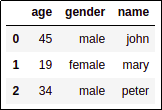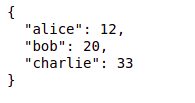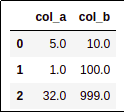Pandas Dataframe Examples: Create and Append data
Last updated:Table of Contents
- Create from lists
- Create from dicts
- Create from dict
- Create empty Dataframe, append rows
- Create with dtypes
Examples using Pandas 2.x
There are many ways to build and initialize a pandas DataFrame. Here are some of the most common ones:
All examples can be found on this notebook
Create from lists
Where each list represents one column.
import pandas as pd
names = ['john','mary','peter','gary','anne']
ages = [33,22,45,23,12]
df = pd.DataFrame({
'names':names,
'ages':ages
})
df
 Probably the most straightforward
Probably the most straightforward way to build dataframes
Create from dicts
To create a dataframe from a list of dicts use pd.DataFrame.from_records().
import pandas as pd
data_dicts = [
{'name':"john","gender":'male','age':45},
{'name':"mary", 'gender':"female",'age':19},
{'name':"peter",'gender':'male', 'age':34}
]
df = pd.DataFrame.from_records(data_dicts)
df
 Since we didn't specify dtypes, they are automatically inferred from the data.
Since we didn't specify dtypes, they are automatically inferred from the data.
Create from dict
To create a dataframe from a single dict using keys the index use pd.DataFrame.from_dict(my_dict, orient='index')
import pandas as pd
d = {"alice": 12, "bob": 20, "charlie": 33}
pd.DataFrame.from_dict(d, orient='index')
 SOURCE DICT: just a simple dict
SOURCE DICT: just a simple dict
 You can set the name of the column
You can set the name of the column if you want, passing
columns=['age'] to from_dict
Create empty Dataframe, append rows
Use append() with ignore_index=True.
import pandas as pd
# if you wish, you can set column names and dtypes here
df = pd.DataFrame()
# must reassign since the append method does not work in place
df = df.append({'col_a':5,'col_b':10}, ignore_index=True)
df = df.append({'col_a':1,'col_b':100}, ignore_index=True)
df = df.append({'col_a':32,'col_b':999}, ignore_index=True)
df
 Since
Since ignore_index is set, indices will start at 0
Create with dtypes
As of version 2.1 this is not possible!
Only one dtype can be passed, which only works if all columns are of that type!
A workaround is to call astype() on every column after initialization.